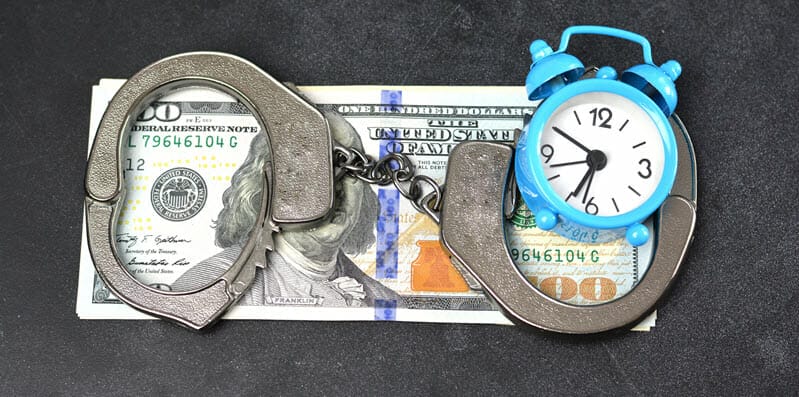
- Felonies
- *
- Misdemeanors
- *
- Drug/Narcotics Violations
- *
- Sex Offenses
- *
- Gun / Weapons Violations
- *
- Robbery
- *
- Burglary
- *
- Assault
- *
- Theft
- *
- White Collar Crimes
- *
- Domestic Assualt
- *
- Property Damage
- *
How Long Does it Take to Get a Bail Bond?
Arrests are stressful. After someone has been arrested, the first thought is how to get out of jail as quickly as possible.
Because you have the right to a speedy trial, most states try to have defendants arraigned within 72 hours of arrest. The time it takes for your first appearance will vary greatly, depending on how busy the jail is at the time of your arrest.
Most jails do not arraign defendants on weekends or holidays. Should you get arrested on one of these, you would have to wait for the judge to come in on the next business day.
What is Bail?
The bail process acts as a contract agreement between a defendant and the court. The judge sets the bail amount, and the defendant pays the amount and agrees to show up for court and to the conditions of release.
Once a defendant pays their bail, they must show up for court, or the judge will revoke the defendant's release. If the defendant shows up for all court dates, they will receive a bail refund.
Bail Schedules Speed Up the Process
Some states have implemented schedules for the bail process that allow them to set a specific amount for common non-violent crimes. These schedules allow defendants to be released from jail without standing before the judge.
How Is the Bail Amount Determined?
Aside from schedules, judges are responsible for setting bail. Judges will look at several factors before determining the amount, including the following:
- The severity of the crime and current charges
- The defendant's criminal history and flight risk
- The defendant's ties to the community
- The defendant's finances
- The defendant's threat to the community based on the crime
The discretion regarding the bail process and the amount is up to the judge. The Eighth Amendment of the United States Constitution prevents excessive amounts, but, unfortunately, judges do not always go by the Eighth Amendment.
Algorithm Bails
Some states are implementing algorithms when deciding a defendant's bail amount. Court officials input the defendant's data, and the computer gives them a score. This score determines the flight risk of the defendant.
What Happens Once Bail Is Set?
Once the court sets the amount, you have a few options. We want you to be aware of your options so you can determine the best one for your needs.
- You can pay the bail amount in cash or with a check. Not all jails accept personal checks.
- Defendants can also put up property with equal or greater value than the bail amount.
- You could borrow the needed amount of money from a friend or have a loved one post the bail money.
- You could also hire a bail bondsman for a surety bond.
What Happens if I Cannot Afford Bail?
An inability to afford your bail amount can become stressful. No one wants to be stuck in jail for longer than necessary because of a lack of money. Unfortunately, you will have to stay in jail if you do not have the money needed to settle the fee, but another option is also available.
Your defense lawyer may go before the court and petition for a reduction in the amount. A reduction petition often results in additional stipulations. Judges may accept the order without a hearing or call the DA and lawyer to present evidence.
As a last option, if you have good credit, you may want to consider a personal loan.
How Many Days Does it Take to Get Bail?
Hiring a professional bail bondsman like us is one of the easiest and most affordable ways to post bail (we accept payment plans where applicable). Bail bonds work by allowing defendants to get released quickly.
First, the co-signer needs to pay the bail bond fee. This fee for bail bonds is a percentage of the bail amount and is non-refundable. Even if the defendant is found not guilty, the fee for bail bonds remains with the bail bonds agency.
The co-signer must sign paperwork and pay the fee before the defendant gets bailed out of jail.
After the fee is paid, the bail bonds agency will contact the jail and put up the bail bond for the defendant. After the bondsman posts bail bonds, the release process can take 2 to 10 hours, depending on how busy the jail officials are.
Conditions of Release
Most judges will put conditions on a defendant before they set bail. The following are some of the typical conditions imposed on defendants:
- The defendant must not break any laws after posting bail.
- The defendant may not use drugs or alcohol and may be subjected to testing.
- Judges may place a condition that prevents the defendant from possessing weapons.
- Defendants may be ordered to stay away from the victim or certain people.
- Judges order some defendants to maintain a curfew.
- Defendants may be monitored until their trial date.
- Judges will often restrict the travel of defendants.
- Judges may also order a defendant to seek classes, drug counseling, or mental health treatment.
What Happens if You Do Not Abide by the Conditions of Release?
If you do not abide by the conditions of release, the judge will issue a bench warrant, and you will be arrested. There are also other repercussions if you do not appear in court or adhere to the conditions of release.
The court will revoke the bail money, and you will owe the entire amount. If you have paid money to a bail bonds agency to post a bail bond, the bondsman may have the right to hire a bounty hunter to bring you in to stand trial.
If you are released on bail, it is in your best interest to heed the conditions set forth by the court. Make sure you know all your court case dates and show up on time.
Bail Bondsman Requirements
In addition to the conditions set forth by the court, bail bondsmen may have stipulations. Failure to abide by these could result in the bail bonds agent revoking the bail and you being placed back in jail.
Bail bondsmen may require the following:
- They may prefer a family member or close friend to put up the money or collateral because the defendant will be more likely to show up for their court dates.
- Bail bondsmen may require you to check in regularly until your court date to ensure you have not left town.
- The bail bond company may also call you before your trial dates to offer a reminder and ensure you show up on time.
You must realize the bail bondsman is taking a financial risk by signing your bail bond amount. Most defendants realize the stipulations above are uncomplicated compared to spending days or weeks in jail.
Types of Bail Bonds
Multiple types of bail bonds are available to defendants in jail. You may have one of the following options:
- Surety Bonds: Bail bondsmen often use an insurance company to secure bail bonds.
- Release on Own Recognizance (OR): Depending on the crime and criminal history of the defendant, you may be offered an OR release. You sign a promise to show up for court dates and are not required to pay any money.
- Property Bond: If you own a house or other property, the bondsman may be able to put the property up instead of cash.
- Immigration Bond: If you are not a citizen, you may be able to be released from jail on an immigration bond to await trial.
- Cite Out: A cite out occurs when a person is caught doing something illegal but is only written a citation and given a court date.
We Are Here to Help
We understand navigating the legal system can be a hectic and stressful time. If a loved one or friend needs a bail bond to be released, we offer support, answers, and guidance. Contact us today to learn about your options and get started right away.






